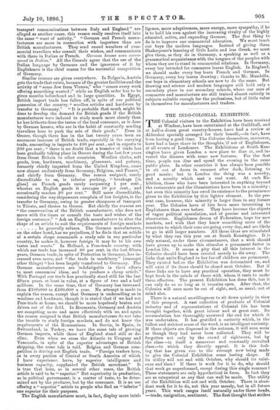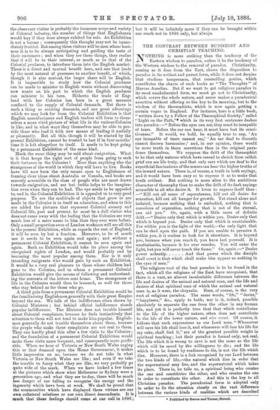THE INDO-COLONIAL EXHIBITION.
THE Colonial visitors to the Exhibition have been received at Windsor, have been entertained at the Guildhall, and at half-a-dozen great country-houses, have had a review at Aldershot specially arranged for their benefit,—in fact, have bsen having a good time. The Colonies themselves, moreover, have had a large share in the thoughts,If not of Englishmen, at all events of Londoners. The Exhibitions at South Ken- sington have given London a new place to dine at, and in- vested the dinners with some new features. For the first time, people can dine and spend the evening in the same public place. In other countries it has always been possible to sit out of doors in summer after dark, listening to good music; but in London the thing was a novelty, and a novelty which met a real want. At each Ex- hibition, those who have been interested in anything beyond the restaurants and the illuminations have been in a minority ; but even this minority has owed its existence to the prominence given to the Exhibition by this lighter element. In the pre- sent case, however, this minority is larger than in any former year. The Colonies have of late been more interesting to Englishmen than ever before. They have become the objects of vague political speculation, and of precise and interested observation. Englishmen dream of Federation, hope for new markets, and wish that they knew something more of the countries to which their sons are going every day, and are likely to go in still larger numbers. All these ideas are stimulated by what they can this year see at South Kensington. It is only natural, under these circumstances, that a wish should have grown up to make this stimulus a permanent factor in London life. It seems a pity that all this interest in the Colonies should have been created merely to die away. The links that unite England to her far-off children are permanent. They existed befcre the Exhibition was determined on, and will exist if its doors should be closed next October. But if these links are to have any practical operation, they must be kept fresh in the minds of those with whom it rests to make them effective. The present Exhibition has done this, but it can only do so so long as it remains open. After that, the Colonies will once more be out of sight, and, as usual, out of mind also.
There is a natural unwillingness to sit down quietly in view of this prospect. A vast collection of products of Colonial industry and of representations of Colonial life has been brought together, with great labour and at great cost. Its accumulation has thoroughly answered the end for which it was undertaken. It has gratified a curiosity which, in the fullest and strictest sense of the word, is an intelligent curiosity. If these objects are dispersed in the autumn, it will soon seem as though they had never been collected. They will be forgotten not only by the crowd of sightseers, but by the class—in itself a numerous and constantly recruited class—to which they directly appeal. It is this feel- ing that has given rise to the attempt now being made to give the Colonial Exhibition some lasting shape. If its utility will not end with October, why should its exist- ence end then ? If there is work for it to do, why should that work go unperformed, except during this single summer? These statements are only hypothetical in form. In fact they are as categorical as any that can well be made. The utility of the Exhibition will not end with October. There is abun- dant work for it to do, not this year merely, but in all future years. This work ranges itself naturally under three heads, —trade, emigration, sentiment. The first thought that strikes the observant visitor is probably the immense scope and variety of Colonial industry, the number of things that Englishmen would buy if they were always exhited for sale. An Exhibition is not a bazaar ; consequently this thought may not be imme- diately fruitful. But among these visitors will be men whose busi- ness it is to be always anticipating and guiding the taste of their customers ; and when they see these things, they realise that it will be to their interest, as much as to that of the Colonial producer, to introduce them into the English market. There is a direct and mutual benefit here, and one that leads by the moat natural of processes to another benefit, of which, though it is also mutual, the larger share will be English. It is impossible to study how the Colonial producer can be made to minister to English wants without discovering new wants on his part to which the English producer can minister in his turn. Hitherto the trade of Eng- land with her Colonies has been in a great measure confined to the supply of Colonial demands. But there is such a thing as creating demands, and one great advantage which we may look for from the Colonial Exhibition is that English manufacturers and English traders will form to them- selves a more vivid picture of what life in the various Colonies is like, and in what ways they themselves may be able to pro- vide those who lead it with new means of leading it usefully or pleasantly. But all this, though it will be started by the present Exhibition, cannot be trusted to last if in four months' time it is left altogether to itself. It needs to be kept going by a permanent Exhibition of the same kind.
Much the same thing may be said about emigration. What is it that keeps the right sort of people from going to seek their fortunes in the Colonies ? More than anything else the strangeness of the world in which they will have to live. Books have till now been the only means open to Englishmen of framing clear ideas about Australia or Canada, and books are scarcely accessible to the class of people who are most drawn towards emigration, and are but feeble helps to the imagina- tion even when they can be had. The eye needs to be appealed to, and in the Colonial Exhibition it is appealed to to very good purpose. To see the multitude of objects that grow or are made in the Colonies is in itself an education, and when to this are added the pictures that represent Colonial scenery and Colonial life, past and present, he must be a dull visitor who does not come away with the feeling that the Colonies are very much less of a mere name to him than they ever were before. Only a small proportion even of London workmen will see all this in the present Exhibition, while as regards the rest of England, it will be seen by but a fraction. Moreover, to be of much use it needs to be seen again and again ; and without a permanent Colonial Exhibition, it cannot be seen again and again. Such an Exhibition would take its place among the recognised sights of London, and would probably end by becoming the most popular among them. Nor is it only intending emigrants who would gain by such an Exhibition. It would be a very real pleasure to those whose children had gone to the Colonies, and to whom a permanent Colonial Exhibition would give the means of following and understand- ing the contents of the letters sent home. The strangeness of life in the Colonies would then be lessened, as well for those who stay behind as for those who go.
A third gain from a permanent Colonial Exhibition would be the familiarising Englishmen generally with their great Empire beyond the sea. We talk of the indifference often shown by Colonial Ministers ; but behind official indifference stands popular indifference. The Minister does not trouble himself about Colonial complaints, because he feels instinctively that attention to them will not tend to make him popular. English- men generally do not trouble themselves about them, because the people who make these complaints are not real to them. They can hardly plead this after a few visits to the Colonies ; and the foundation of a permanent Colonial Exhibition would make these visits more frequent, and consequently more profit- able. When we hear of Victoria or New South Wales urging this or that demand upon the Home Government, it makes little impression on us, because we do not take in what Victoria or New South Wales are like ; and even if we take the trouble to fancy what they are like, we very probably go quite wide of the mark. When we have looked a few times at the pictures which show what Melbourne or Sydney were a generation ago, and what they are to-day, there will be much less danger of our failing to recognise the energy and the ingenuity which have been at work. We shall be proud that the communities which have displayed these virtues are our own collateral relations or our own direct descendants. It is mach that these feelings should come at our call in 1886; but it will be infinitely more if they can be brought within our reach not in 1886 only, but always.

















































 Previous page
Previous page